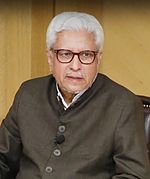Farahi school
The topic of this article may not meet Wikipedia's general notability guideline. (July 2023) |
| Part of a series on Sunni Islam |
|---|
|
|

The Farahi school (Urdu: فراہی مکتبہ فکر) is a school of thought that originated in the Indian subcontinent, named and established by Hamiduddin Farahi, a cousin and student of the Indian Sunni Hanafi scholar Shibli Nomani. Unlike other schools of thought, which focus more on the practise taqlid, the Farahi school puts greater emphasis on the self-source of reasoning (Ijtihad) of the individual, seeking to tackle modern issues within a paradigm based on reason and revelation.[1]
History[edit]
Hamiduddin Farahi was born during the times of British Raj. A cousin of the famed theologian and historian Shibli Nomani, from whom he learned Arabic.[1] After finishing his studies, He taught in many religious schools, including, Sindh Madressatul Islam University, Karachi, (from 1897 to 1906),[2] Muhammadan Anglo-Oriental College (MAO) and Darul Uloom, Hyderabad. During his stay in Hyderabad, Farahi proposed the idea of establishing a university, in which all religious and modern sciences would be taught in Urdu. He subsequently travelled to 'Sara-e-Mir', a town in Azamgarh, where he took charge of the Madrasatul Islah, an institution which was based on the educational ideas of Shibli Nomani and Farahi, The Islamic scholar Amin Ahsan Islahi (who later immigrated to Pakistan), was one of them.[3] Islahi greatly influenced another prominent scholar of the era, Javed Ahmad Ghamidi.[1][4]
Methodology[edit]
The main focus of the Farahi School revolves around a contextualised understanding of the Qurʾān, the study of all other branches, such as the Hadith is based on a constant reference to the Qurʾān. It is this unwavering centrality given to the Qurʾān that has enabled the Farahi School to produce academically and intellectually profound and consistent. Thus, by making the Qurʾān its sole yardstick, this school has been able to engage with modern-day scholarship on a variety of issues relating to Islamic history. The Farahi school does however deny every allegation of Quranism, stating that it merely prioritises the Qurʾān over other sources of jurisprudence. The school thus makes use of a variety of sources to reinforce its positions, though it does not shy away from putting canonised sources, such as Bukhari and Muslim under scrutiny.[5] A major principle of the Farahi School is the emphasis on the fact that the Ḥadīth tradition must always be studied in light of the Qurʾān. In this respect, the Farahi school alleges that most differences in opinion rise due to a misapplication of the Ḥadīth, whereby the Ḥadīth tradition is not understood in light of the Qurʾān but used to understand the Qurʾān. An example of this within the school is the issue of drawn images, the Qurʾān nowhere mentions their prohibition, on the contrary, the Qurʾān makes mention of their existence at the court of Solomon.[6] The Ḥadīth tradition does however mentions the prohibition of images.[7] If this report is contextualised in light of the Qurʾān and historical circumstances of the prophetic era, the attentive reader will conclude that this particular prohibition was aimed at pictures that were utilised for worship by idolaters. Dr. Javad Ahmad Ghamidi illustrates this hermeneutical principle.
“… All things presented as parts of the faith shall be accepted and rejected in light of the Qurʾān. All of the arguments on faith and belief must start and end on it. All other claims of revelations, inspirations, research and or opinion must be tested against the Qurʾān. It must be accepted that the authority of the Qurʾān reigns over Abu Hanifa or Shafi’i, Bukhari or Muslim, Ashari or Maturidi and Juaniad or Shibli alike. Anything that contradicts it shall not and cannot be accepted.”[8]
Notable people[edit]
- Allama Iqbal
- Abul Kalam Azad
- Sulaiman Nadvi
- Amin Ahsan Islahi
- Javed Ahmad Ghamidi
- Muhammad Farooq Khan
- Khalid Masud
- Nouman Ali Khan
- Israr Ahmed
- Mohammad Akram Nadwi
- Shehzad Saleem
References[edit]
- ^ a b c "The Farahi School Of Thought – Personalities and Contributions". STUDYISLAM.
- ^ Akram Khan, Muhammad (2013). What is Wrong with Islamic Economics?. Edward Elgar Publishing. p. 195. ISBN 9781782544159.
- ^ Rehan Ahmad Yousufi (24 August 2018). "Profile of Hamidduddin Farahi". AL-MAWRID HIND FOUNDATION website. Retrieved 5 April 2020.
- ^ Malik, Jamal (2020). Islam in South Asia. Brill. p. 580. ISBN 978-9004422711.
- ^ "The Farahi School of Thought – Personalities and Contributions – Study Islam an initiative by Al-Mawrid Hind Foundation". 2018-08-25. Retrieved 2024-05-31.
- ^ "Surah Saba - 13". Quran.com. Retrieved 2024-05-31.
- ^ "Sahih al-Bukhari 2086 - Sales and Trade - كتاب البيوع - Sunnah.com - Sayings and Teachings of Prophet Muhammad (صلى الله عليه و سلم)". sunnah.com. Retrieved 2024-05-31.
- ^ "The Farahi School of Thought – Personalities and Contributions – Study Islam an initiative by Al-Mawrid Hind Foundation". 2018-08-25. Retrieved 2024-05-31.

